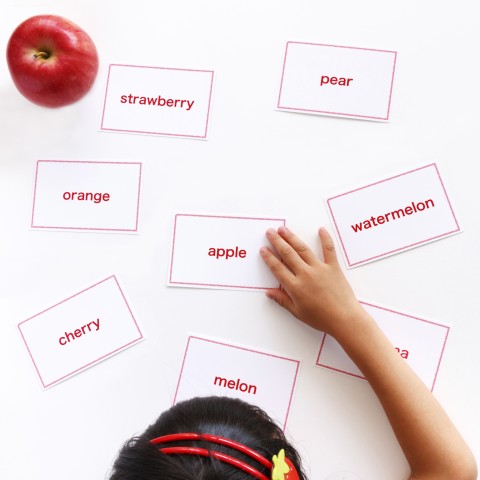
Indonesian verbs are both very different from English verbs and very easy to learn.
How can that be? Well, it turns out that Indonesian syntax is pretty close to English syntax, and the verb complications simply add extra shades of meaning—we’re not dealing with huge differences here.
Since verbs are indisputably important to everything you want to say in Indonesian, here’s a list of the most common Indonesian verbs, divided into categories based on both grammatical function and meaning.
We’re not even going to explain very much here about the grammar. By the time you get to the end, you’ll be amazed at how much you’ve picked up!
Ready to learn Indonesian verbs? Let’s get to it.
 Table of Contents
Table of Contents
1. Warmup: Common No-Prefix Verbs

The majority of Indonesian verbs have prefixes that sort of guide the meaning. You’ll see more details on Indonesian verb prefixes soon, but here are some very common and important verbs that simply don’t come with prefixes at all.
1. duduk – to sit
Jangan duduk di kursiku.
“Don’t sit on my chair.”
2. ingat – to remember
Ingatlah apa yang saya akan laporkan.
“Remember what I’m going to report.”
3. masuk – to enter
Mari, masuk!
“Welcome, enter!”
4. lupa – to forget
Kok aku lupa membawa air.
“Oh gosh, I forgot to bring water.”
5. mulai – to begin
Acaranya tidak akan mulai hari ini.
“The event won’t begin today.”
6. tahu – to know
Dia tidak tahu apa pun.
“He doesn’t know anything.”
7. minum – to drink
Anda harus minum lebih banyak teh.
“You have to drink more tea.”
8. selesai – to finish
Rere belum selesai tugasnya.
“Rere hasn’t finished her work yet.”
9. tidur – to sleep
Aku akan tidur di luar.
“I’m going to sleep outside.”
10. kembali – to return
Fitri sudah lama belum kembali dari Cina.
“Fitri hasn’t come back from China for a long time.”
2. Part 1: Ber- Verbs

Verbs in Indonesian beginning with the prefix ber- are always intransitive.
Let’s start out this section on Indonesian intransitive verbs with some of the easiest to grasp. If you add ber- to concrete nouns, such as an article of clothing or a mode of transportation, it simply means “to wear or use that thing.”
11. bertopi – to wear a hat
Dia laki-laki yang bertopi.
“He’s a man with a hat.”
12. bersepeda – to go by bike
Kalau bersepeda, jam berapa kita akan sampai?
“If we go by bike, what time will we arrive?”
13. berkapal – to travel by boat (not common)
14. berkuda – to ride a horse
Saya bisa melihat tiga orang berkuda.
“I can see three people on horses.”
15. berkacamata – to wear glasses
Bapakku tidak berkacamata di rumah.
“My father doesn’t wear glasses at home.”
16. berjas – to wear a jacket
Harus berjas di restoran itu?
“Do you have to wear a jacket in that restaurant?”
17. bertubuh kurus/gemuk – to be thin/fat (literally to have a thin or fat body)
Tidak sehat bertubuh terlalu kurus.
“It’s not healthy to be too skinny.”
18. bercelana pendek – to wear shorts
Banyak orang di California bercelana pendek pada musim dingin.
“Many people in California wear shorts in the winter.”
Other ber- verbs are based on more abstract roots. There’s no good reason for why some roots can stand alone, like those in the last section, while other verbs require ber- to sound acceptable. You simply have to memorize these:
19. berubah – to change; to alter oneself
Cinta tidak berubah.
“Love does not change.”
20. berdiri – to stand
Berdiri! Jangan duduk!
“Stand up! Don’t sit!”
21. belajar – to study
Di mana Anda belajar bahasa Inggris?
“Where did you study English?”
22. berjalan – to walk
Aku lebih suka berjalan daripada naik motor.
“I like walking rather than riding a motorbike.”
23. berenang – to swim
Ibuku berenang di laut setiap hari.
“My mother swims in the ocean every morning.”
24. bekerja – to work
Orang muda tidak suka bekerja di sawah.
“Young people don’t like working in rice fields.”
25. berpikir – to think
Aku berpikir kamu tidak tahu jawabannya.
“I think you don’t know the answer.”
26. bertemu – to meet with somebody
Saya sangat senang bertemu dengan Anda.
“I’m very happy to meet with you.”
27. berbicara – to speak a language
Apakah kamu bisa berbicara bahasa Arab?
“Can you speak Arabic?”
28. berlari – to run
Saya tidak bisa berlari secepat kamu.
“I can’t run as fast as you do.”
29. berarti – to mean
Kata “pisau” berarti “alat masak yang digunakan untuk memotong.”
“The word ‘knife’ means ‘kitchen implement used for cutting.’”
30. bernyanyi – to sing
Apakah kamu suka bernyanyi di kamar mandi?
“Do you like to sing in the shower?”
31. berjudi – to gamble
Anak perempuan saya suka berjudi setiap akhir minggu.
“My daughter likes to gamble every weekend.”
3. Part 2: Me- Verbs

Virtually all of the Indonesian language verbs in this section are transitive, but there are a few very common ones that aren’t necessarily transitive. Let’s get those out of the way first.
32. menikah – to marry
Mungkin dia tidak akan menikah.
“Maybe he won’t get married.”
33. menginap – to stay overnight
Apakah kalian sedang menginap di kota?
“Are you all staying in the city?”
34. menangis – to cry
Bayi itu mulai menangis.
“The baby started to cry.”
35. mendidih – to boil
Kalau airnya sudah mendidih, masukkan mi ke dalam panci.
“If the water is boiling, put the noodles in the pot.”
36. mendaftar – to register
Di mana gedung untuk mendaftar?
“Where is the building to register?”
As me- otherwise indicates transitivity, there are a lot of verbs we can choose from here. Let’s break it up into a few helpful topics.
By the way, in colloquial Indonesian speech, you’ll often hear these words with the m sound omitted, beginning instead with the ng– sound or without the prefix at all.
Moving Things Around
Here are some Indonesian verbs about actions in physical space. You’ll see these on signs all around Indonesia, like “push,” “pull,” and so on.

37. membuat – to make
Saya tidak tahu bagaimana membuat sandwich.
“I don’t know how to make a sandwich.”
38. membangun – to build
Mereka sedang membangun hotel baru di pusat kota.
“They’re building a new hotel in the city center.”
39. membuka – to open
Dia membuka kotak dan melihat di dalam.
“He opened the box and looked inside.”
40. menutup – to close
Apa kamu yakin kamu sudah menutup pintu gudang baik-baik?
“Are you sure you closed the storage room door properly?”
41. mendorong – to push
Anak itu dimarahi karena mendorong temannya pada waktu pelajaran olahraga.
“That kid was scolded for pushing his friend during P.E.”
42. menarik – to pull
Di jalan ada sebuah kuda yang sedang menarik kereta.
“There’s a horse pulling a cart in the street.”
43. melemparkan – to throw
Apakah kamu bisa melemparkan bola basket?
“Can you throw a basketball?”
44. menjatuhkan – to drop
Adik menjatuhkan telur sampai pecah lagi.
“Little brother dropped and broke the eggs again.”
45. menghentikan – to stop
Apakah kamu bisa menghentikan suara itu?
“Can you stop that sound?”
46. menggeser – to slide
Kamu harus menggeser pintunya karena itu pintu geser.
“You have to slide the door because it is a sliding door.”
47. memotong – to cut
Saya kurang hati-hati dan memotong jariku.
“I wasn’t careful and I cut my finger.”
48. menyetir – to drive
Aku tidak suka menyetir mobil kecil.
“I don’t like driving small cars.”
Interacting with People and Things

Now for some slightly more abstract transitive verbs. A few of these appear mostly in respectful addresses, but in a society like Indonesia’s, there’s a lot of respectful addresses flying around.
49. menjaga – to watch
Apakah kamu mau menjaga anjingku?
“Do you want to watch my dog?”
50. mengenal – to know somebody
Mereka pasti tidak mengenal kamu.
“They definitely don’t know you.”
51. menolong – to help
Denny menolong anaknya dengan pekerjaan rumah.
“Denny helps his child with homework.”
52. mengajar – to teach
Guru mengajar anak-anak kalkulus.
“The teacher teaches children calculus.”
53. memberi – to give
Rudi memberi botol air yang terakhir kepada Rina.
“Rudi gave the last bottled water to Rina.”
54. meminjam – to lend; to borrow
Setiap hari Sabtu saya meminjam sebuah buku dari perpustakaan.
“Every Saturday, I borrow a book from the library.”
55. menghormati – to honor
Hari raya itu untuk menghormati pahlawan Indonesia.
“The holiday is for honoring Indonesia’s heroes.”
56. menghargai – to appreciate; to respect
Aku menghargai persahabatan kita.
“I value our friendship.”
57. mengobrol – to chat
Mereka sedang mengobrol dan tidak bekerja.
“They’re chatting and not working.”
58. mengerti – to understand
Maaf, saya tidak mengerti.
“Sorry, I don’t understand.”
59. melaporkan – to report
Dia akan melaporkan berita secara langsung.
“She’s going to report the news live.”
60. menjelaskan – to explain
Mungkin Anda bisa menjelaskan hal ini?
“Maybe you can explain this situation?”
Spare-Time Activities
You’ve learned before how to talk about your hobbies in Indonesian. But did you discuss all of the activities on this Indonesian verbs list?

61. menulis – to write
Bapakku masih sedang menulis bukunya.
“My father is still writing his book.”
62. mengetik – to type
Seberapa cepat Anda bisa mengetik?
“How fast can you type?”
63. menonton – to watch
Apakah Anda mau menonton film baru?
“Do you want to watch the new film?”
64. mendengarkan – to listen to
Dia suka mendengarkan lagu romantis.
“He likes listening to romantic songs.”
65. mencuci – to wash
Aku harus mencuci sepatu.
“I have to wash my shoes.”
66. menggambar – to draw
Saya bisa menggambar apa saja.
“I can draw anything at all.”
67. membaca – to read
Aku belum membaca buku bapakku karena dia belum selesai menulisnya.
“I haven’t yet read my father’s book because he hasn’t finished it yet.”
68. memainkan – to play
Aku tidak bisa memainkan Fortnite malam ini.
“I can’t play Fortnite tonight.”
69. membeli – to buy
Di mana Anda membeli tas ini?
“Where did you buy this bag?”
70. menjual – to sell
Di sana ada toko yang menjual helm motor.
“There’s a shop that sells motorcycle helmets.”
71. memasak – to cook
Apakah kamu tahu bagaimana memasak mi goreng?
“Do you know how to cook fried noodles?”
72. mencium – to kiss
Aku melihat dia mencium pacarnya.
“I saw them kissing their partner.”
73. membayar – to pay
Ada diskon 50% kalau Anda membayar dengan kartu kredit.
“There is a 50% discount if you pay with credit card.”
74. mencetak – to print
Di mana saya bisa mencetak skripsi?
“Where can I print my thesis?”
75. mengecat – to paint
Kamu masih belum mengecat gedung itu, benar?
“You still haven’t painted the building, right?”
Changing Something
The –i and -kan suffixes have many meanings. Among them is a sense of changing something’s state, such as making something “clean” or “dark.”
76. mengotori – to make dirty
Kalau kamu pakai sepatu di dalam rumah, kamu akan mengotori lantai.
“If you wear shoes indoors, you’ll make the floor dirty.”
77. membersihkan – to clean up
Kapan kamu akan membersihkan kantormu?
“When are you going to clean your office?”
78. menerangi – to illuminate
Lampu menerangi jalan pada sore hari.
“The lamps light up the street in the evening.”
79. mengisi – to fill
Ibu itu mengisi kaleng bekas minyak goreng dengan tepung.
“That woman filled an empty cooking oil tin with flour.”
80. membasahi – to dampen
Hujan akan membasahi Bumi.
“The rain will wet the earth.”
81. mengeringkan – to dry
Aku akan mengeringkan pakaian dengan hairdryer.
“I’m going to dry my clothes with a hair dryer.”
82. memanaskan – to heat
Ovennya memanaskan rumah.
“The oven is heating the room.”
83. melengkapi – to complete
Rina melengkapi penampilannya dengan seulas lipstik merah.
“Rina completed her look with a stroke of red lipstick.”
84. memperbaiki – to fix; to repair
Siapa di sini bisa memperbaiki pesawat?
“Who here can fix a plane?”
If you’re interested in why some of these have an -i ending and others have a -kan ending, well, that’s a subtle distinction beyond the scope of this article. You can find many more grammar explanations on our website! Also be sure to keep on the lookout for our upcoming article on Indonesian verb conjugation!
4. Part 3: Ter- Verbs
Ter- verbs usually describe a state or an accidental action. They can also describe “having an ability,” but those verbs aren’t particularly common, so you don’t have to learn about them yet.
States of Being

85. terletak – to be located
Hotel Matahari terletak di pusat kota Jakarta.
“The Matahari Hotel is located in the center of Jakarta.”
86. terbuat – to be made of
Pintu terbuat dari kaca.
“The door is made of glass.”
87. terbatas – to be limited
Waktu untuk mendaftar terbatas.
“The time for registration is limited.”
88. terbuka – to be open
Pintu terbuka dan kucing keluar.
“The door opened and the cat went out.”
89. tersedia – to be available
Sarapan Barat tersedia setiap hari.
“A Western breakfast is available everyday.”
90. tersebut – to be mentioned
Hukum tersebut tidak adil.
“The aforementioned law is not fair.”
91. terhormat – to be honored
Wakil yang terhormat, mohon untuk duduk.
“Honored representative, please sit.”
92. terkenal – to be known
Dia terkenal di negara Asia Tenggara.
“He is well-known in Southeast Asian countries.”
93. tertarik – to be interested
Aku tidak tertarik dengan sejarah.
“I’m not interested in history.”
Oops, accident!

In English, passive verbs are used for both accidental and intentional actions. In Indonesian, they work differently.
You can take any one of the hundreds of men- verbs and change the affix to di– to indicate the passive voice. But if you change it to ter– instead, it usually picks up the meaning of “doing something unintentionally.” Let’s have a look.
94. tertidur – to doze off
Mengapa kamu selalu tertidur dalam kelas?
“Why do you always fall asleep in class?”
95. terkejut – to be startled
Aku terkejut waktu aku melihat laba-laba itu.
“I was startled when I saw the spider.”
96. terjadi – to happen
Apa yang akan terjadi kalau dia tidak datang?
“What will happen if she doesn’t arrive?”
97. tertabrak – to crash
Motor tertabrak dengan truk.
“A motorcycle crashed into a truck.”
98. terjatuh – to fall
Gelas terjatuh dari meja.
“The glass fell from the table.”
99. tersenyum – to smile
Dia tersenyum pelan-pelan.
“She smiled slowly.”
100. tertawa – to laugh
Mereka semua tertawa.
“They all laughed.”
5. Conclusion
What a list! Congratulations, you’re one hundred verbs richer! And beyond that, if you read through the whole list, you’ve also read the equivalent of several pages of Indonesian text from the example sentences alone.
If you’re comfortable with Indonesian pronunciation, you could go back and read some of your favorite ones aloud. That would stick them in your mind much better than just passively absorbing them through text would!
No matter how long our lists of verbs are, though, it’s not the same as experiencing the full language. For that, you’ll need an audio or video program like IndonesianPod101, where you can get your hands on tons of fascinating, instructive Indonesian content.
You’ll probably even find verbs that aren’t on this list!
Before you go, feel free to reach out with any questions or concerns you have in the comments section. Are there any verbs you still want to know? We look forward to hearing from you!











 Table of Contents
Table of Contents





















 Table of Contents
Table of Contents






 Table of Contents
Table of Contents






































